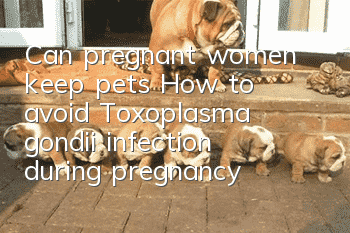Can pregnant women keep pets? How to avoid Toxoplasma gondii infection during pregnancy?

Expectant mothers + pets are actually not that scary!
The arrival of a new life not only makes the whole family look forward to it with joy, but also heralds the beginning of a new stage. Families raising pets face more problems. It is rumored that pets can spread toxoplasmosis, and infection in pregnant women can lead to miscarriage and fetal malformations. Some expectant mothers have to separate from their pets due to pressure, but many people wonder, do they really have to say goodbye to their pets when they are pregnant?
What is Toxoplasma gondii
Toxoplasma gondii is a single-cell protozoa. It is an obligate intracellular parasite that travels with the blood and reaches various parts of the body. It is almost the most successful single-celled animal on the planet and is ubiquitous around the world. Many mammals and birds, including various livestock and poultry, are often infected by it, and infections also occur in humans.
What is the relationship between Toxoplasma gondii and pregnancy?
First of all, let me explain something: If ordinary adults (non-pregnant women or couples preparing to become pregnant) are infected with Toxoplasma gondii, it will not have any impact on their health, so don’t worry. Unless it is acute Toxoplasma gondii, treatment is required. What we call Toxoplasma gondii infection mainly targets pregnant women and couples who are preparing to become pregnant.
In fact, only the first infection during pregnancy has the possibility of causing fetal abnormalities, and only with a certain probability. Because you were infected with Toxoplasma gondii before pregnancy, your body will produce antibodies and you will not be infected in the future.
Therefore, pre-pregnancy check-up is very necessary. If you plan to get pregnant and suspect that you may be infected with Toxoplasma gondii, it is best to get tested for Toxoplasma gondii six months in advance and take precautions until the child is born.
If you are infected with Toxoplasma gondii in the first 3 months of pregnancy, the risk of the fetus being infected is 15%;
If you are infected with Toxoplasma gondii in the second trimester of pregnancy, the risk of fetal infection increases to 30%;
If you are infected with Toxoplasma gondii in late pregnancy, the risk of the fetus being infected increases to 60%, because the transmission rate of Toxoplasma gondii is faster in late pregnancy.
However, although the probability of infection increases as the gestational age increases, its impact on the child decreases as the gestational age increases.
Toxoplasma gondii is not necessarily spread by pets
1. If you eat the meat of infected animals, if the cooking temperature is not enough or the time is too short, and the Toxoplasma gondii or cysts in it are not killed, there will be a risk of infection.
2. When exposed to contaminated soil, cysts can survive in the external environment for a long time. They can live for months or even years in moist soil. Humans or animals may be infected if they come into contact with them.
3. Some people are born with Toxoplasma gondii infection during pregnancy or the original latent infection occurs during pregnancy. Toxoplasma gondii can reach the placenta from the blood circulation, and the fetus can then acquire the infection through the blood circulation between the placenta and the placenta.
Cat people
So far, cats are the only domestic animals confirmed to eventually shed Toxoplasma gondii oocysts. Cats infected with Toxoplasma will spread eggs within the first two weeks of infection, and the oocysts in cat feces need to "hatch" in the environment for 1 to 5 days before becoming infectious. But infection is only possible after consuming food, water or dust contaminated by cat feces. Based on this calculation, the probability that an expectant mother will raise a cat that happens to be dangerous and become infected is very small.
Paw star
Dogs are the intermediate host of Toxoplasma gondii and can also be infected with Toxoplasma gondii. However, their feces and excrement are not contagious. Therefore, if you do not eat their meat and simply come into contact with dogs, you will not be infected.
Stay away from Toxoplasma gondii and ensure the health of the whole family
In fact, toxoplasmosis is easy to detect. One of the pre-pregnancy tests for expectant mothers is the TORCH test, in which T refers to Toxoplasma gondii. If the mother has been infected before pregnancy, there will be no risk of infecting the fetus after treatment. You can take your pet to the hospital to have blood drawn for Toxoplasma antibody testing for IgG and IgM.
Pay attention to check up and do a Toxoplasma test three months before pregnancy (experts recommend that women infected with Toxoplasma can become pregnant after 6 months). If you have not been infected with Toxoplasma gondii before pregnancy and have not been vaccinated, you should pay attention to re-examination at each stage of pregnancy~
And regularly test your pet to check whether it is infected with Toxoplasma gondii. Pay attention to pet care, pay attention to hygienic pet care, clean up pet feces every day, do not let cats go out, do not feed raw meat, and do not let them go outside to hunt. It is best to feed finished cat food, regularly disinfect pet supplies, and receive regular vaccinations. Do not adopt stray cats, especially kittens, for the time being, and do not raise new cats after pregnancy.
Pregnant mothers should avoid excessively close contact with pets: do not kiss, sleep together, eat at the same table, etc.; remember to wash your hands frequently after petting pets. Maintain hygiene habits and maintain hygiene at home. It is best for pregnant women not to come into direct contact with pet excrement and avoid contact with cat litter. Water and soil contaminated by Toxoplasma gondii may also contaminate some fruits and vegetables, so pregnant women try not to eat raw food to ensure Eat clean or fully cooked.
- Tips for raising a Portuguese Water Dog
- How to train Chinese Shar-Pei
- Can dogs eat prune meat?
- Why hasn’t my dog pooped in a few days?
- Why is Teddy shaking?
- Why does my dog's stool turn white?
- What's the problem when a dog can't hold his urine?
- What causes yellow urine in dogs?
- Why is the Teddy dog lame inexplicably? A must-read for pet owners!
- 4 solutions to dog constipation



